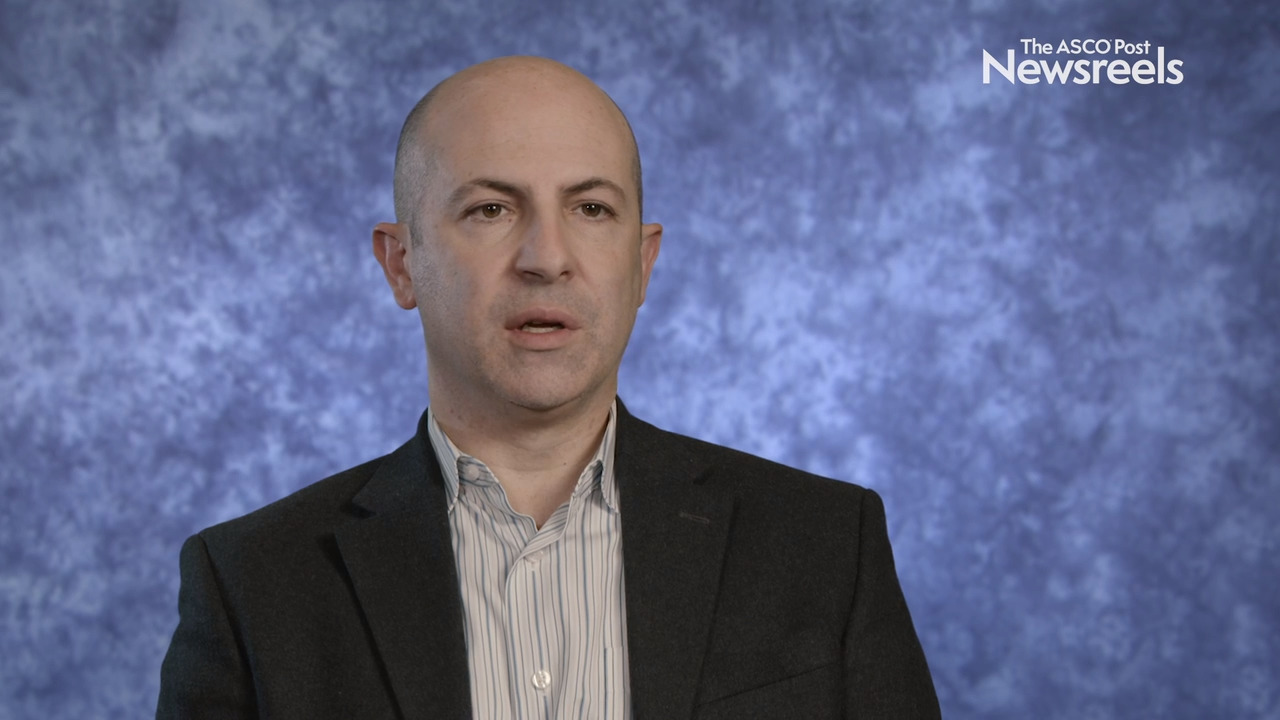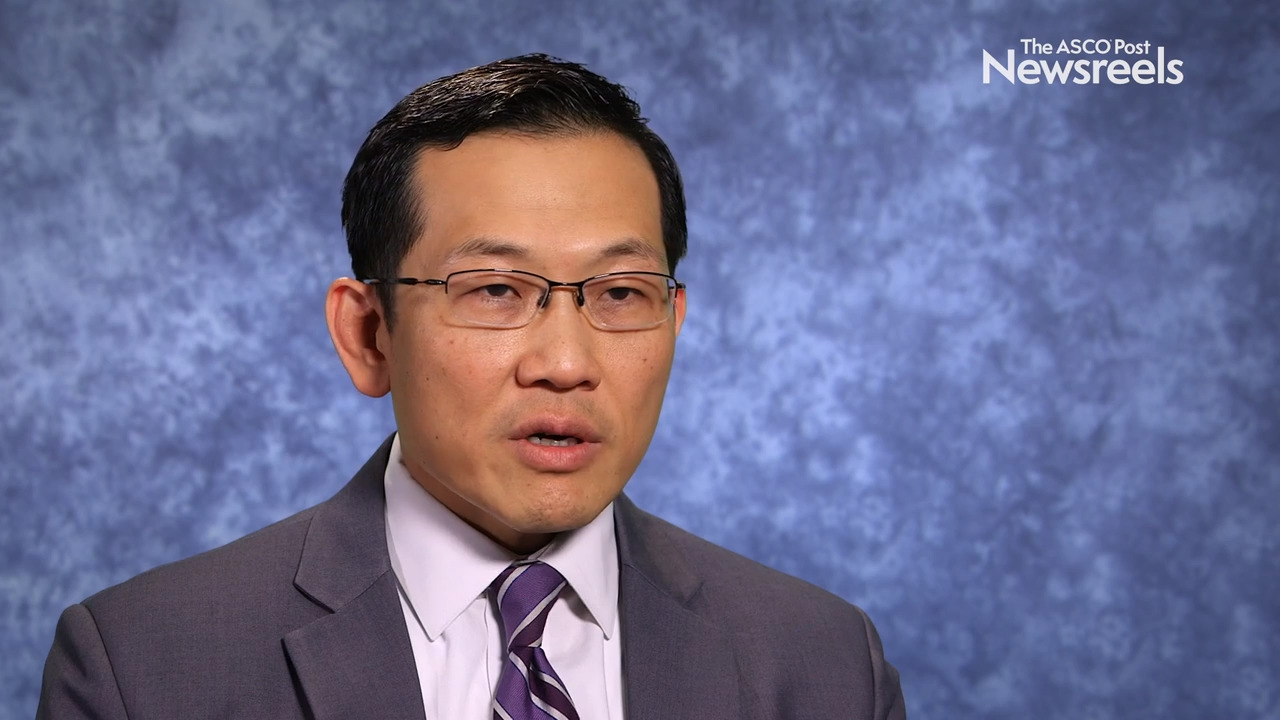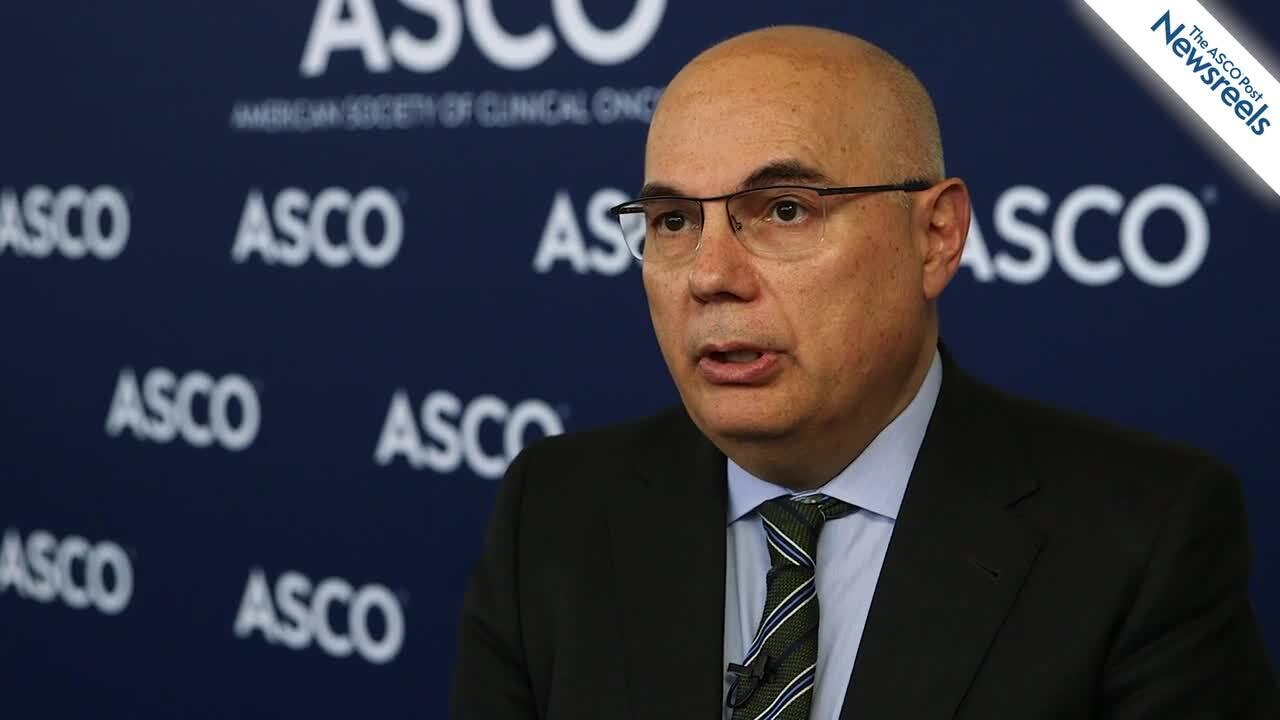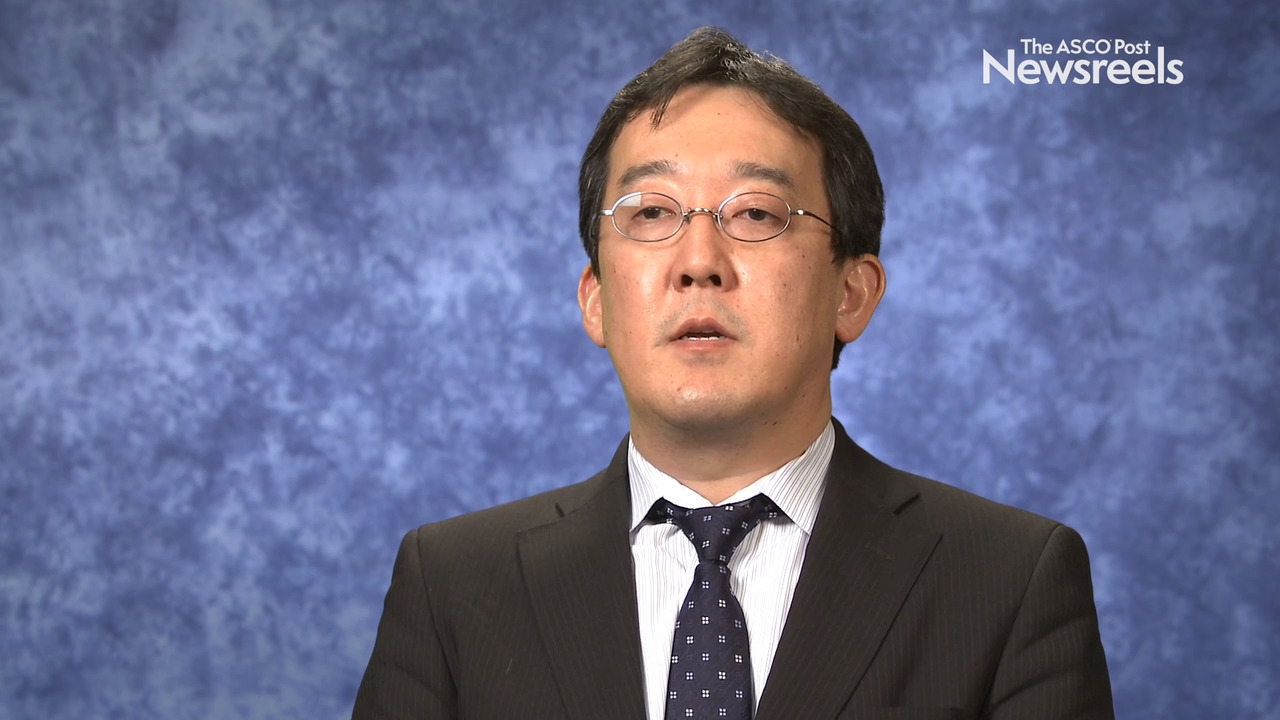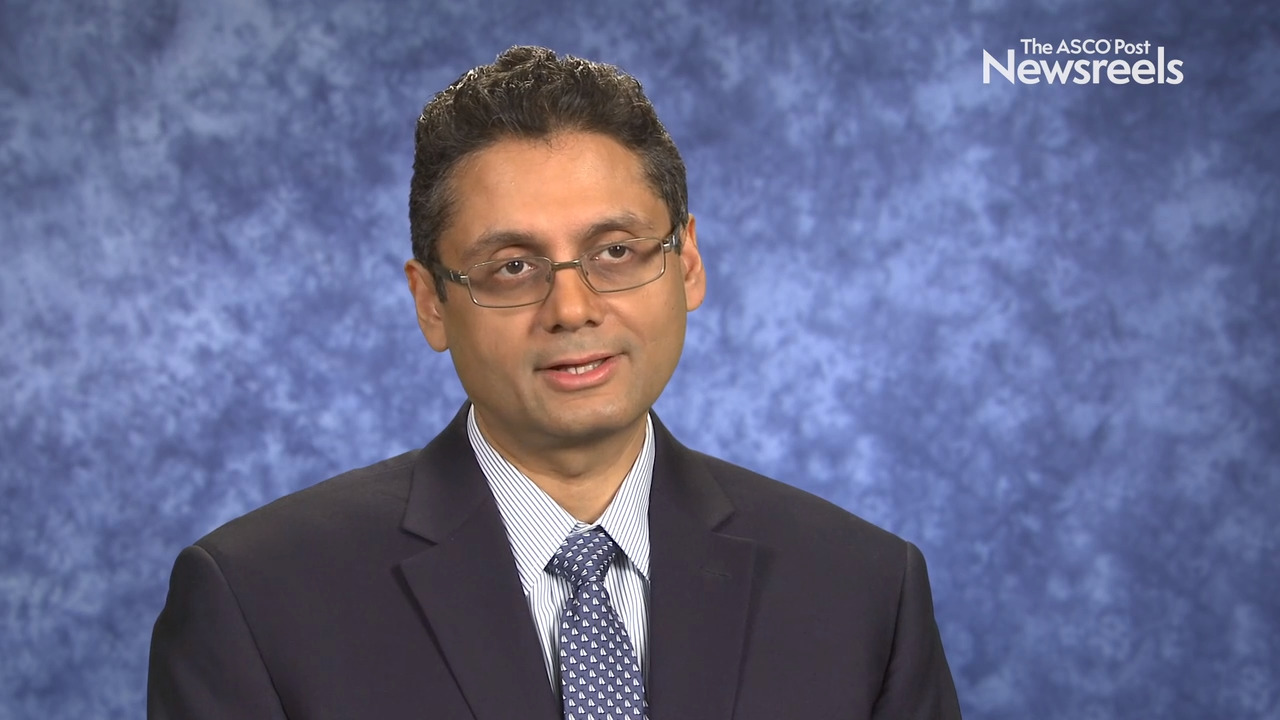Pembrolizumab in MSI-H and CPS ≥ 10 Advanced Gastric or Gastroesophageal Junction Cancer: Subanalysis of KEYNOTE-059, -061, and -062
The survival benefit of pembrolizumab in advanced gastric/gastroesophageal junction cancer with microsatellite instability–high (MSI-H) tumors or a combined positive score (CPS) ≥ 10 was established in post hoc subanalysis of three KEYNOTE trials. Findings were presented at the 2020...
Conference Highlights From the 2020 Gastrointestinal Cancers Symposium
This past January, the 2020 Gastrointestinal Cancers Symposium was held in San Francisco. More than 3,600 individuals attended and more than 900 abstracts and posters were presented. Among the highlights presented at the meeting and reported in the pages of The ASCO Post, several studies in...
Proton Beam Therapy vs Intensity-Modulated Radiation Therapy for Locally Advanced Esophageal Cancer
In a single-institution phase IIb trial reported in the Journal of Clinical Oncology, Steven H. Lin, MD, PhD, and colleagues found that proton beam therapy was associated with less toxicity and similar progression-free survival vs intensity-modulated radiation therapy in patients with locally...
Expert Point of View: Daniel V.T. Catenacci, MD
Daniel V.T. Catenacci, MD, of the University of Chicago Medical Center and Biological Sciences, emphasized the value of the patient having microsatellite instability–high (MSI-H) status as a biomarker for immunotherapy. The analysis by Chao et al “highlights how well patients with MSI-H tumors do,...
Survival Benefits Achieved With Pembrolizumab in MSI-H and CPS ≥ 10 Gastric/Gastroesophageal Junction Cancer
Post hoc subanalyses of three KEYNOTE trials established the survival benefit of pembrolizumab in advanced gastric/gastroesophageal junction cancer with microsatellite instability–high (MSI-H) tumors or a programmed cell death ligand 1 (PD-L1) combined positive score (CPS) ≥ 10 (ie, the number of...
Expert Point of View: Daniel V.T. Catenacci, MD
Daniel V.T. Catenacci, MD, Associate Professor of Medicine and Director of the Gastrointestinal Oncology Program at the University of Chicago, was the JAVELIN Gastric 100 study’s invited discussant. After offering an extensive background on the use of immunotherapy in gastric or gastroesophageal...
No Survival Benefit for Maintenance Avelumab in Advanced Gastric or Gastroesophageal Junction Cancer
In the phase III JAVELIN Gastric 100 trial, a strategy called “switch maintenance” with the immune checkpoint inhibitor avelumab after 12 weeks of first-line induction chemotherapy did not statistically improve overall survival for treatment-naive patients with HER2-negative advanced gastric or...
FDA Pipeline: Priority Reviews in Lung Cancers, Lymphoma
This week, the U.S. Food and Drug Administration (FDA) granted Priority Review to treatments for non–small cell and small cell lung cancers, as well as for diffuse large-B cell lymphoma (DLBCL); Breakthrough Therapy designation to an antibody-drug conjugate for bladder cancer; and a double Fast...
Expert Point of View: Marcia Cruz-Correa, MD, PhD
Marcia Cruz-Correa, MD, PhD, Professor of Medicine at the University of Puerto Rico and Adjunct Professor of Surgical Oncology at The University of Texas MD Anderson Cancer Center, congratulated the investigators on the conduct of the PANGEA trial and the outcomes it achieved for patients. “When...
PANGEA Trial Shows Personalized Antibody Selection May Improve Outcomes in Gastroesophageal Cancer
A personalized approach to selecting antibody therapy for patients with newly diagnosed stage IV gastroesophageal adenocarcinoma resulted in a 1-year overall survival rate of 66% and a median overall survival of 16.4 months in the PANGEA study (see Table 1).1 The study used a novel clinical...
Zev A. Wainberg, MD, on PD-L1–Positive Advanced Gastric Cancer: MSI and Combined Positive Score and Pembrolizumab vs Chemotherapy
Zev A. Wainberg, MD, of the UCLA Medical Center, discusses the first subset analysis of how a combined positive score in gastric and gastroesophageal junction cancers related to the efficacy of pembrolizumab in PD-L1–positive disease (Abstract 427).
Treatment of Advanced Esophagogastric Cancer According to ERCC1 Expression
As reported in the Journal of Clinical Oncology by Iqbal and colleagues, the phase II SWOG S1201 trial showed a progression-free survival benefit with platinum-containing vs nonplatinum treatment among all patients with previously untreated HER2-negative advanced esophagogastric cancer and in a...
Trifluridine/Tipiracil in Recurrent, Metastatic Gastric or Gastroesophageal Junction Adenocarcinoma
Early in 2019, trifluridine/tipiracil tablets were approved for the treatment of adult patients with metastatic gastric or gastroesophageal junction adenocarcinoma previously treated with at least two prior lines of chemotherapy that included a fluoropyrimidine; a platinum; either a taxane or...
Nivolumab vs Taxane Therapy in Refractory Esophageal Squamous Cell Carcinoma
As reported in The Lancet Oncology by Ken Kato, MD, and colleagues, the phase III ATTRACTION-3 trial conducted in predominantly Asian patients has shown a survival benefit with nivolumab vs paclitaxel or docetaxel in patients with advanced esophageal squamous cell carcinoma who were refractory to...
Trifluridine/Tipiracil Survival Benefit for Patients With Metastatic Gastric Cancer Who Had or Had Not Undergone Prior Gastrectomy
In a subgroup analysis of the phase III TAGS trial (TAS-102 Gastric Study) reported in JAMA Oncology, David H. Ilson, MD, PhD, and colleagues found positive trends in survival benefit with trifluridine/tipiracil treatment vs placebo for patients with pretreated metastatic gastric cancer or...
Nivolumab vs Chemotherapy in Previously Treated Advanced Esophageal Squamous Cell Carcinoma
As reported in The Lancet Oncology by Kato et al, the phase III ATTRACTION-3 trial conducted in predominantly Asian patients has shown a survival benefit with nivolumab vs paclitaxel or docetaxel in patients with advanced esophageal squamous cell carcinoma who were refractory to or intolerant of...
Steven H. Lin, MD, PhD, on Esophageal Cancer: Proton Beam vs Intensity-Modulated Radiation Therapy
Steven H. Lin, MD, PhD, of The University of Texas MD Anderson Cancer Center, discusses phase II findings that showed proton beam therapy improved total toxicity burden score with no difference in progression-free survival when compared with intensity-modulated radiation treatment (Abstract LBA2).
Pembrolizumab in Advanced Esophageal Squamous Cell Cancer With PD-L1 Expression of CPS ≥ 10
On July 30, 2019, pembrolizumab was approved for the treatment of patients with recurrent locally advanced or metastatic squamous cell carcinoma of the esophagus whose tumors express programmed cell death ligand 1 (PD-L1; Combined Positive Score [CPS] ≥ 10), as determined by a U.S. Food and Drug...
Can Lymph Node Response to Neoadjuvant Chemotherapy Predict Prognosis in Esophageal Cancer?
In a study published by Urakawa et al in Annals of Surgery, researchers found that the response of lymph nodes to neoadjuvant chemotherapy is more effective in predicting disease recurrence and patient survival in individuals with esophageal cancer than the response of primary tumors....
FDA Approves Pembrolizumab for Some Patients With PD-L1–Positive Esophageal Cancer
On July 30, the U.S. Food and Drug Administration (FDA) approved the programmed cell death protein 1 inhibitor pembrolizumab (Keytruda) as monotherapy for the treatment of patients with recurrent locally advanced or metastatic squamous cell carcinoma of the esophagus whose tumors express programmed ...
Ramucirumab Plus Pembrolizumab in Previously Treated Advanced Gastroesophageal Cancer, NSCLC, and Urothelial Carcinoma
Results from a phase IB trial expansion stage reported in The Lancet Oncology by Herbst et al showed the combination of ramucirumab plus pembrolizumab had manageable toxicity and antitumor activity in previously treated advanced gastroesophageal cancer, non–small cell lung cancer (NSCLC), and ...
FDA Approves New Trastuzumab Biosimilar
On June 14, the U.S. Food and Drug Administration (FDA) approved trastuzumab-anns (Kanjinti) for all approved indications of the reference product trastuzumab (Herceptin): for the treatment of HER2-overexpressing breast cancer and HER2-overexpressing metastatic gastric or gastroesophageal junction...
Trifluridine/Tipiracil in Recurrent, Metastatic Gastric and Gastroesophageal Junction Adenocarcinoma
In the Clinic provides overviews of novel hematology and oncology agents, addressing indications, mechanisms of action, administration recommendations, safety profiles, and other essential information needed for the appropriate clinical use of these drugs. On February 22, trifluridine/tipiracil...
Expert Point of View: Ian Chau, MD
IAN CHAU, MD, a consultant medical oncologist at the Gastrointestinal and Lymphoma Units of The Royal Marsden NHS Foundation Trust in London and Surrey, United Kingdom, was the invited discussant of KEYNOTE-062. In an interview with The ASCO Post, he first commented that although single-agent...
KEYNOTE-062: Pembrolizumab Is a New First-Line Option in Gastric/Gastroesophageal Junction Cancer
KEYNOTE-062, a study of first-line treatment in patients with advanced gastric or gastroesophageal junction adenocarcinoma, found pembrolizumab to be noninferior to chemotherapy and perhaps better than chemotherapy in a subgroup of patients. The results were reported at the 2019 ASCO Annual Meeting ...
FDA Approves New Trastuzumab Biosimilar
Today, the U.S. Food and Drug Administration (FDA) approved trastuzumab-anns (Kanjinti) for all approved indications of the reference product trastuzumab (Herceptin): for the treatment of HER2-overexpressing breast cancer and HER2-overexpressing metastatic gastric or gastroesophageal...
Josep Tabernero, MD, PhD, on Advanced Gastric or Gastroesophageal Junction Adenocarcinoma: Pembrolizumab With or Without Chemotherapy vs Chemotherapy
Josep Tabernero, MD, PhD, of the Vall d’Hebron Institute of Oncology, discusses phase III findings of the KEYNOTE-062 study showing that, for some patients with advanced gastric or gastroesophageal junction cancer, pembrolizumab may improve survival and may be an effective alternative to chemotherapy, with fewer side effects (Abstract LBA4007).
2019 ASCO: KEYNOTE-062: Pembrolizumab With or Without Chemotherapy vs Chemotherapy in Advanced Gastric or GEJ Adenocarcinoma
The randomized, phase III KEYNOTE-062 trial achieved its primary endpoint, showing that for patients with programmed cell death ligand 1 (PD-L1)-positive, HER2-negative, advanced gastric or gastroesophageal junction (GEJ) cancer, initial therapy with pembrolizumab resulted in noninferior overall...
Trastuzumab Deruxtecan in Advanced HER2-Positive Gastric and Breast Cancers
Two phase I studies reported in The Lancet Oncology indicate activity of the antibody-drug conjugate trastuzumab deruxtecan in advanced HER2-positive gastric cancer and advanced HER2-positive breast cancer previously treated with trastuzumab emtansine (T-DM1). Trastuzumab deruxtecan (DS-8201a) is a ...
2019 ASCO: Reduced Chemotherapy Dosages in Elderly Patients With Advanced Gastroesophageal Cancer
A phase III randomized clinical study evaluating the optimum dose of a combination chemotherapy regimen of oxaliplatin and capecitabine in the treatment of advanced gastroesophageal cancer in frail and elderly patients has found that the patients prescribed the lowest dose tested experienced less...
Perioperative Therapy With FLOT vs ECF/ECX in Locally Advanced Gastric Adenocarcinoma
In the German phase II/III FLOT4 trial reported in The Lancet, Al-Batran et al found that perioperative therapy with the docetaxel-based triplet FLOT (fluorouracil [5-FU]/leucovorin, oxaliplatin, and docetaxel) was associated with improved overall survival vs ECF/ECX (epirubicin and cisplatin plus...
Paclitaxel or Cisplatin Plus Fluorouracil in Chemoradiotherapy for Locally Advanced Esophageal Cancer
In the Chinese phase III ESO-Shanghai 1 trial reported in the Journal of Clinical Oncology, Chen et al found that paclitaxel plus fluorouracil did not significantly prolong overall survival vs standard cisplatin plus fluorouracil in definitive concurrent chemoradiotherapy (dCRT) for locally...
KEYNOTE-181: Pembrolizumab vs Chemotherapy in Second-Line Treatment of Advanced Esophageal Cancer
IN THE GLOBAL phase III KEYNOTE-181 trial, pembrolizumab as second-line therapy for advanced esophageal cancer did not improve overall survival in the whole population, vs chemotherapy, but did improve survival for patients with strong expression of programmed cell death ligand 1 (PD-L1),...
AACR 2019: Small Study of Virotherapy Plus Radiotherapy for Patients With Esophageal Cancer Unable to Receive Standard Treatments
The experimental oncolytic adenovirus telomelysin in combination with radiotherapy was safe and showed early clinical efficacy in vulnerable patients with esophageal cancer, according to results from a phase I clinical trial presented by Fujiwara et al at the American Association for ...
FDA Approves Trastuzumab-qyyp in HER2-Overexpressing Breast and Gastric Cancers
The U.S. Food and Drug Administration (FDA) has approved trastuzumab-qyyp (Trazimera), a biosimilar to trastuzumab (Herceptin), for the treatment of human epidermal growth factor receptor-2 (HER2)-overexpressing breast cancer and HER2-overexpressing metastatic gastric or gastroesophageal...
FDA Approves Trifluridine/Tipiracil for Recurrent, Metastatic Gastric and GEJ Adenocarcinoma
ON FEBRUARY 22, the U.S. Food and Drug Administration approved trifluridine/tipiracil tablets (Lonsurf)—a fixed combination of trifluridine, a nucleoside metabolic inhibitor, and tipiracil, a thymidine phosphorylase inhibitor—for adult patients with metastatic gastric or gastroesophageal junction...
FDA Approves Trifluridine/Tipiracil for Recurrent, Metastatic Gastric and GEJ Adenocarcinoma
On February 22, the U.S. Food and Drug Administration approved trifluridine/tipiracil tablets (Lonsurf)—a fixed combination of trifluridine, a nucleoside metabolic inhibitor, and tipiracil, a thymidine phosphorylase inhibitor—for adult patients with metastatic gastric or...
Addition of First-Line Ramucirumab to Cisplatin and Fluoropyrimidine in Metastatic Gastric or Gastroesophageal Junction Adenocarcinoma
In the phase III RAINFALL trial reported in The Lancet Oncology, Fuchs et al found no apparent benefit of the addition of the VEGFR-2 inhibitor ramucirumab to first-line cisplatin and fluoropyrimidine treatment in metastatic gastric or gastroesophageal junction adenocarcinoma. Study Details The...
Effectiveness of EsophaCap Tool in the Diagnosis of Barrett’s Esophagus
Barrett’s esophagus is the only known precursor of esophageal adenocarcinoma. Although endoscopy and biopsy are standard methods for diagnosing Barrett’s esophagus, their high cost and risk limit their use as a screening modality. Researchers sought to develop a screening method based...
Takashi Kojima, MD, on Esophageal Cancer: Results From the KEYNOTE-181 Trial on Immunotherapy vs Chemotherapy
Takashi Kojima, MD, of the National Cancer Center Hospital East, discusses phase III study findings on pembrolizumab vs chemotherapy as second-line treatment for advanced esophageal cancer (Abstract 2).
Manish A. Shah, MD, on Gastric Cancer: Results From the GAMMA-1 Study on First-Line Combination Therapy
Manish A. Shah, MD, of NewYork–Presbyterian/Weill Cornell Medical Center, discusses phase III data on the efficacy and safety of andecaliximab combined with mFOLFOX6 as first-line treatment in patients with advanced gastric or gastroesophageal junction adenocarcinoma (Abstract 4).
FDA Approves Biosimilar Trastuzumab-dttb
On January 18, the U.S. Food and Drug Administration (FDA) approved trastuzumab-dttb (Ontruzant), a biosimilar referencing trastuzumab, across all eligible indications—namely, adjuvant treatment of HER2-overexpressing breast cancer, metastatic breast cancer, and metastatic gastric cancer or...
2019 GI Cancers Symposium: Addition of Andecaliximab to mFOLFOX6 in Treatment-Naive Advanced Gastric or GEJ Adenocarcinoma
A phase I/Ib study found that the addition of andecaliximab, a monoclonal antibody that inhibits matrix metalloproteinase 9, to modified fluorouracil (5-FU), leucovorin, and oxaliplatin (mFOLFOX6) showed activity in gastric and or gastroesophageal junction (GEJ) carcinoma. Based on these...
Hybrid Minimally Invasive Esophagectomy vs Open Esophagectomy in Esophageal Cancer
In a French phase III trial reported in The New England Journal of Medicine, Mariette et al found that a hybrid minimally invasive surgical procedure was associated with reduced postoperative complications vs transthoracic open esophagectomy in patients with resectable cancer of the middle or lower ...
Pembrolizumab in Pretreated Advanced Esophageal Adenocarcinoma or Squamous Cell Carcinoma
As reported in JAMA Oncology by Shah et al, the phase II KEYNOTE-180 trial has shown that pembrolizumab produces durable responses in some patients with pretreated locally advanced or metastatic esophageal adenocarcinoma or squamous cell carcinoma. Study Details In the trial, 121 patients with...
Genetic Assay May Help Predict Disease Relapse in Patients With Gastroesophageal Cancer
A seven-gene assay could improve care for patients with gastroesophageal cancer by predicting their likelihood of relapse after chemotherapy and surgery. These findings were published by Smyth et al in Annals of Oncology. A team at The Institute of Cancer Research (ICR), London, and The Royal...
FDA Pipeline: What’s New in Biosimilars, Drug Reviews, Designations, and More
The U.S. Food and Drug Administration (FDA) recently issued the following new approvals and designations: Approval for Pegfilgrastim Biosimilar The FDA recently approved a pegfilgrastim biosimilar, pegfilgrastim-cbqv (Udenyca). The biosimilar has been approved to decrease the incidence...
ESMO 2018: Pooled Analysis of Influence of Sex on Chemotherapy Efficacy and Toxicity in Esophagogastric Cancer
In an analysis presented by Davidson et al at the European Society for Medical Oncology (ESMO) 2018 Congress (Abstract 619PD_PR), data were pooled from four UK randomized controlled clinical trials of first-line chemotherapy in esophagogastric cancer, finding significant differences in a...
Pertuzumab and Trastuzumab Plus Chemotherapy in HER2-Positive, Metastatic Gastric or Gastroesophageal Junction Cancer
As reported in The Lancet Oncology by Tabernero et al, the phase III JACOB trial showed no significant overall survival benefit of adding pertuzumab (Perjeta) to trastuzumab (Herceptin) plus chemotherapy in first-line treatment of HER2-positive metastatic gastric or gastroesophageal junction...
Immunotherapy in Advanced Esophagogastric Cancer
As reported in the Journal of Clinical Oncology by Janjigian et al, the phase I/II CheckMate-032 study has shown activity of nivolumab (Opdivo) and nivolumab plus ipilimumab (Yervoy) in advanced esophagogastric cancer. In the esophagogastric cohort of the multicohort study, 160 patients (who...
